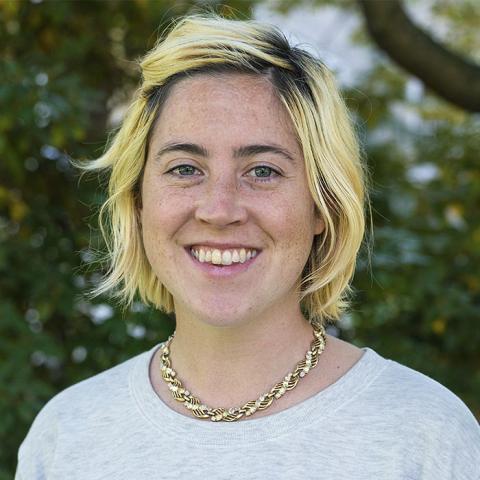Meet the CPGC: Juli Grigsby
Assistant Professor of Anthropology Juli Grigsby, fourth from left, with students at the Civil Liberties and Public Policy Conference at Hampshire College in 2017.
Details
This semester we’re profiling the staff and faculty who are part of the Center for Peace and Global Citizenship. This week, meet Juli Grigsby, Assistant Professor of Anthropology and CPGC steering committee member.
Since joining the Department of Anthropology as an assistant professor in 2016, Juli Grisgby has been a key contributor to campus initiatives including Horizons (formerly MSP) and the Provost’s Classroom Climate Taskforce. Now, Grigsby begins her first appointment on the Center for Peace and Global Citizenship steering committee for the upcoming year.
Comprising four faculty members and several CPGC staff members, the steering committee is charged with better defining and understanding relationships between experiential learning and the curriculum. This is a goal Grigsby is well-positioned to contribute to, as experiential learning has been a core component of her courses.
“Over the past four years, the CPGC and I have fostered a relationship of mutual support. Through CPGC faculty funding my students have curated exhibits, attended conferences, and launched campus education campaigns. On the other hand, I have participated in forums, movie screenings, and attended symposiums, all of which not only enrich my teaching but often provide students an additional avenue to engage course concepts.”
Grigsby’s courses, which have included “Reproductive Justice, Social Movements, and Civil Society” and “Race, Sexuality, and Criminalization,” and her own research on the intersections of race, gender, violence and activism in urban black communities in California and the African Diaspora, have clear throughlines to the CPGC’s mission and programs.
“[The] Center has grown to include a number of community engagement opportunities that speak to my courses directly. By recognizing that nuanced conversations of equity, justice, and action must also take place on campus the CPGC has cultivated a social milieu of inquiry and critique that indicates Haverford is not exempt from discussions of equity, inclusion, and ethical social practice.”
This year, as we celebrate the CPGC’s 20th anniversary, the steering committee will help envision the future of the Center, building on the work of recent committees that have re-clarified the CPGC’s core commitments: dedication to global citizenship as an object of inquiry and action; commitment to community-driven (“nothing about us without us”) efforts; and location at the heart of a rigorous liberal arts institution, with ability to integrate community action and outputs with public scholarship.
“In order to engage global communities, we must critically inquire about the ethics of developing community partnerships," Grigsby says. "I believe one of the most promising aspects of the CPGC mission is the insistence on partnership and collaboration in a way that does not prioritize student professionalization but instead seeks to recalibrate our understanding of service-learning. Only by truly understanding the needs, aims, and values of our community partners can we build sustainable programs that move towards social justice.”
The importance of this particular approach to building partnership, as well as supporting students, has been magnified in recent months, as Grigsby reminds us.
“We are now In the context of pronounced racial justice uprising, COVID public health crisis, and pandemic fatigue. As we have all seen, communication, media literacy, and content production is increasingly important to the ways we access and engage information. It will be imperative that the Center develop accessible programming. I look forward to how the CPGC will support existing and new community partners on paths to public scholarship. This moment requires all of us to not only pivot our programming but also to broadly imagine what public engagement and scholarship must look like."




